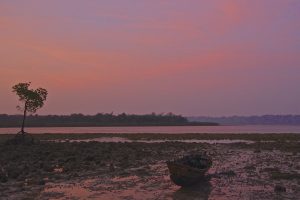COVID-19’s impact on the indigenous populations of India’s Andaman and Nicobar Islands (ANI) is reason for serious concern. Some of them are already endangered or on the brink of extinction. There is a possibility now of the pandemic wiping out some of these communities.
An archipelago of 572 islands that lie to the east of the Indian mainland in the Bay of Bengal, the ANI has a population of about 380,000 people. While the Indian mainland reported its first COVID-19 case on January 30, it was only on March 26 that the pandemic announced its arrival in the ANI. The coronavirus’ spread there was slow at first; the numbers began to rise rapidly from July 19. Positive cases surged from 548 on July 31 to 1,625 on August 10.
As of August 26, 2,945 people have tested positive for COVID-19 in the ANI and 37 of them have died so far. ANI’s positivity rate — the percentage of those tested who are actually infected — is over three times the national average.
More worryingly, COVID-19 has hit ANI’s endangered indigenous communities. “Five members of the Great Andamanese tribe, a Particularly Vulnerable Tribal Group (PVTG), have tested positive for COVID-19,” the Hindu reported on August 27.
Six tribal groups consisting of the Great Andamanese, the Jarawa, the Onge, the Shompen, the Sentinelese, and the Nicobarese live in the ANI today. Excluding the Nicobarese, the rest fall under the PVTG category. According to the 2011 census, there are only 44 Great Andamanese, 380 Jarawa, 101 Onge, 229 Shompen, and 15 Sentinelese remaining.
The ANI’s tribal groups are known to have low immunity. Sexually transmitted diseases, mainly syphilis, has brought the Great Andamanese — once the ANI’s largest tribal group — to near extinction. The coronavirus is the latest existential threat for them.
Contact with the outside world has cost these tribal groups dearly. This was most evident during colonial rule. Pacification strategies and diseases brought in by colonial settlers claimed the lives of around 80 percent of the roughly 8,000 indigenous people of the ANI by the 20th century. By 1921, the Aka-Kols and Oko-Juwoi were rendered extinct. The Aka-Bea vanished a decade later.
Independent India has struggled to maintain a balance between leaving the indigenous communities to themselves and bringing to them the fruits of “development.” It has not been able to protect them from malign outsiders.
The Jarawa have been the worst hit in this regard. Although they live in a designated reserve, “development” has destroyed their way of life. The Andaman Trunk Road, which runs through the Jarawa reserve, has enhanced their vulnerability to outsider influence, exploitation, and disease.
Measles hit the Jarawa in 1999 and again in 2006. No deaths were reported at the time. In 2015, several Jarawa were diagnosed with measles, conjunctivitis, and acute broncho-pneumonia congestion. Fatalities were reported.
Of the five PGTVs, the Jarawa are said to be the most vulnerable to infection in the current pandemic as they live just 100 km from Port Blair — ANI’s COVID-19 hotspot. In the wake of the pandemic, authorities have shifted the Jarawa to the most isolated part of the island they inhabit.
The Great Andamanese who tested positive have been moved from the Strait Island, their normal place of habitation, to a hospital in Port Blair where they are being treated. They are said to be out of danger. Authorities are testing members of other tribal groups too for COVID-19.
The ANI’s indigenous groups are said to have inhabited the archipelago for around 40,000 years. Just a handful survived assaults from outsiders. Will they be able to defeat the coronavirus?

































